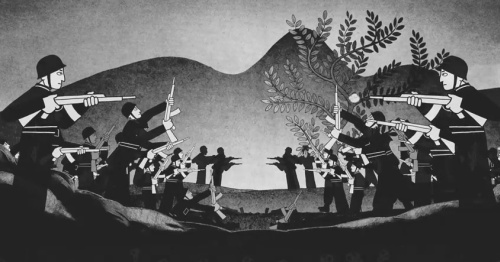(Can I pass off my appalling MIFF puns as a tribute to the bad puns of old cartoon titles? No? Oh.)
Well, I’ve finished MIFF with three films back-to-back this afternoon; all good (or at least enjoyable), thankfully. I also saw two on Friday. So I might as well wrap them up briefly while the thoughts are fresh.
Persepolis (Marjana Satrapi, 2007)
I’ll do a fuller review of this in the next week or so (hopefully), so more on this later. But suffice to say it’s brilliant, and you absolutely should see it when it comes out.
Encounters at the End of the World (Werner Herzog, 2007)
I didn’t dislike this to the same extent Mark Lavercombe at Hoopla did, but it was disappointing. Sharing more than a little in common with Herzog’s earlier science-fiction / documentary / head-scratcher The Wild Blue Yonder (which I covered at a previous MIFF, see here), it sees Herzog travel to Antarctica to talk to various research scientists. Herzog is, of course, an eccentric of long standing, and sometimes (most recently in Grizzly Man) his off-kilter perspective can be strangely brilliant. Here, though, he generally comes across as foolish. He has some interesting interview subjects, and certainly gets some great footage in the scenes of diving under ice (it’s here the film resembles Wild Blue Yonder – it may even reuse some of the same footage). But he consistently seems the least intelligent person in the room: his narration ruminates on humanity’s relationship with the environment, but his interview subjects are vastly more informed than he is on the topic. Funny, often beautiful, and Herzog is never a waste of time; but there’s a sense that Herzog is resting on his laurels as one of the great documentarians, rather than really chasing down a great story as he did back in Grizzly Man.
Dead-End Drive-In (Brain Trenchard-Smith, 1986)
I’m surprised this isn’t better remembered as a guilty pleasure in the same way Trenchard-Smith’s earlier BMX Bandits is. A strange half-cousin of Mad Max, it is set in a lawless near-future Australia where the government has turned drive-in cinemas into ad-hoc prisons. It’s a nutty but fun premise, and the film is actually pretty good in a trashy kind of way. What really kills it are the terrible performances: George Miller had Mel Gibson and Steve Bisley, while Trenchard-Smith has to make do with Ned Manning and Wilbur Wilde. Wilde, in particular, gives a horrendous performance that will leave you in no doubt why, when the producers of Houseboat Horror were looking to cast a Hey Hey It’s Saturday band member, they went for Animal. The silliness of the premise and amateurishness of the cast separates it from the professionalism George Miller’s series, and maybe there was no room commercially for a knock-off like this once Miller had taken that series to the heights he did in Mad Max 2. But still, Trenchard-Smith deserves kudos for a really good job with the camera. The film looks great, making excellent use of location in its early stretches and milking the limited stunt budget for all it’s worth. There’s some ham-fisted commentary about racism that, while out of place, is interesting for foreshadowing what John Howard would do to the country (this was released two years before Howard’s 1988 comments about Asian immigration).
Roadgames (Richard Franklin, 1981)
This one’s reputation preceded it, and did not disappoint. I knew Franklin was a very capable crafstman from his work on the surprisingly good Psycho II, and here he also has a witty, clever script courtesy of Everett De Roche. The film follows the cat-and-mouse games of a truck-driver, Quid, (Stacey Keach) who becomes convinced the driver of a van he’s sharing the road with is a serial killer. What I enjoyed was the amount of humour injected through Keach’s character, and the extent to which Franklin and de Roche keep you guessing despite apparently having tipped their hand right at the start. They continuously pay-off scenes against your expectations, and the ambiguity about whether Quid is right, or if he has misidentified the killer and has actually become a rogue truck driver (a la Duel) is maintained until surprisingly late in the proceedings.
Idiots and Angels (Bill Plympton, 2008)
Bill Plympton’s grimly compelling parable is a return to form compared to his last feature, the disappointing Hair High. Dialogueless, it tells the story of an apparently immoral man who wakes up one morning with wings on his back; they seem to want him to use his life for good, but he’s having none of it. Plympton is purportedly the only animator ever to animate an entire feature himself, and he has made an art out of creative use of labour saving devices such as still frames and repeated cycles (even where there is movement, I doubt he’s using more than a few drawings a second). Yet while his staccato animation is occasionally jarring, it allows him to fully develop his incredibly strong visual sense, and to not compromise his vision. This is a lot darker than my previous favourite film of Plympton’s, his debut feature The Tune, but it retains an underlying sense of humour and a fascination with grotesque bodily distortions.
